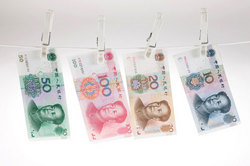 The devaluation of the yuan will not have any direct impact on Russian financial and currency markets, but overall will have a positive impact on the ruble. For example, a weak yuan is to support Chinese exports and push the cost of oil up, according to the Bank of Russia. The devaluation of the yuan will not have any direct impact on Russian financial and currency markets, but overall will have a positive impact on the ruble. For example, a weak yuan is to support Chinese exports and push the cost of oil up, according to the Bank of Russia.
The largest in the last 20 years, the devaluation of the yuan will not have direct and immediate implications for Russian economic market, convinced the Central Bank. With all this weak yuan in the end can even support the ruble, causing the growth in the oil market.
"Directly devaluation of the yuan is not expected to have an important influence on the situation in the Russian economic market and the dynamics of the ruble the volume of transactions with the Renminbi in the domestic currency market is highly insignificant comparing, for example, with the volume of transactions with the United States dollar or the Euro", - said the Bank of Russia.
With all this, the Central Bank expects that the weakening of the yuan ever have a positive impact on oil tariffs, reports RIA Novosti. Therefore, indirectly the decision of the people's Bank of China on the lower exchange rate will help the ruble, which is still losing ground.
"In the medium term we can expect that the weakening of the RMB will promote the growth of Chinese exports and revive its financial growth. It is in the end beneficial to large-scale commodity tariffs, even on oil, which will contribute to the strengthening of the ruble", - noted in the Bank of Russia.
On the eve of the people's Bank of China reduced by 1.9%, the official rate of the yuan to the dollar, and now lowered it by a further 1.6% to 6,3306 yuan per dollar. It noted that the measure was a one-off, adding that will maintain the stability of the national currency on a rational level and to strengthen the role of the market in determining the fixing.
In the International monetary Fund (IMF) decision of the people's Bank of China welcomed. According to the IMF, these actions will allow the market to play a more important role in determining the exchange rate.
"Flexibility in determining the exchange rate important for China, because he wants to give the market a role in characterizing the economy and rapidly integrated into global money markets", - is told in the statement of the IMF.
The yuan tied to the dollar, which in recent years have markedly strengthened against the world's hard currencies. It hurt Chinese exporters and their competitiveness. The result at the beginning of July 2015, with exports from China fell by 7%, since the beginning of the year the decline was 1%. The index of business activity in the country is also declining, which is not encouraging.
The slowing Chinese economy triggered a withdrawal of capital from the stock market, which collapsed in a matter of weeks by 30%. This has caused rates to fall alloys and oil, since China is considered to be one of the biggest consumers of raw materials, and even a small decline in demand of him frees up enormous amounts on the market.
In the end, the price of Brent crude fell below $ 50 per barrel, sending the Russian ruble to the currency levels of winter - 2015. Now the dollar on the MICEX rose above 65 rubles, and the Euro took a casual bar 72 of the ruble.
sections: Economics, World News
|